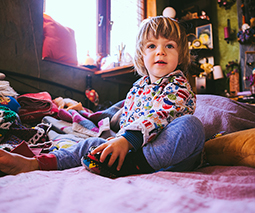Are you a ‘permissive parent’ and is it too late to change your ways?

If you’re the sort of exhausted parent who is constantly giving in to your child’s outrageous demands then perhaps you’ve strayed into permissive parenting territory?
What is permissive parenting?
Permissive parenting is a term coined by psychologist Diana Baumrind in the late ’60s.
Diana looked at preschoolers and found that their parents mostly fitted into three parenting styles – authoritarian parenting, authoritative parenting and permissive parenting.
Permissive parents fall into two clear sub-categories – neglectful or indulgent. It’s the indulgent type we are talking about in this story. This sort of permissive parent is often warm and loving, but they may also impose very few boundaries for their kids and struggle with being consistent, enforcing rules or consequences.
Permissive parents don’t like to disappoint their children and they may find it very hard to say no, too.
Love and boundaries
While permissive parents might be seeking to shower their kids in love and spare them difficult feelings and disappointment, they unwittingly reinforce some negative behaviours in their kids.
Children of permissive parents may become egocentric, struggle with impulses, have difficulty following rules and find interpersonal relationships a challenge.
Studies have found there are some other negative consequences for the children of permissive parents. Children of permissive parents may have problems with emotional regulation, they may have low self-reliance, have lower self-esteem than their peers and they may be more susceptible to gaming or screen addiction. More here.

Permissive parenting vs free-range parenting
Is permissive parenting the same as free-range parenting? Not really. While free-range parents seek to foster independence, initiative and critical thinking in their child, permissive parents tend to protectively underestimate their child’s potential and abilities.
Permissive parents are more likely to make parenting decisions that minimise conflict and effort, aiming to keep the peace.
How can parents turn things around if they’ve gotten a little too permissive?
Don’t lose heart. You can start working on new approaches right this minute. If you’re really struggling, it can be a brilliant idea to chat to a counsellor about the challenges of parenting and why you tip into permissive parenting against your better judgement and intentions sometimes, too.
Here’s how to turn around your permissive habits and provide more structure and consistency …
1. Set clear boundaries
Develop clear family rules that everyone understands. Enforce these rules consistently – and notice when you’re tempted to loosen them up. Instead of shifting the goal posts and confusing your child, work together to – as calmly and compassionately as possible – stay within the boundaries you decided on.

2. Establish a routine
Establish clear routines that provide a framework for your family, so that your child knows what is expected of them and what’s going to happen next.
This helps you to work together within some defined guidelines and establishes security and trust. Ideally!
3. Stay on track
If your child exhibits behaviour that’s challenging, try hard to be the calmest person in the room.
Remind them of what’s appropriate and what you expect in this situation. If your child’s too upset to listen, let them know that you’ll talk about their behaviour later, when they are calm … and then follow up, reminding them of what’s expected and discussing how they – and possibly you! – could have done things differently.
If you’re keen to freshen-up a parenting style that might have gotten away with you, then there is help at hand. The University of Sydney is currently running a brilliant free online program called Parentworks which provides evidence-based parenting guidance for parents of kids aged two – 16. It’s part of a study they are currently doing on Australian parents. Head here for more info.









